Dr Wai In The Scripture Of No Words, Hitman, The Enforcer (1995, 1996, 1998)
Directed by: Ching Siu-Tung, Corey Yuen, Stephen Tung
Written by: Chan Hing-kai, Charlie Yeung, Cheng Kam-fu, Lam Wai-lun, Sandy Shaw Lai-king, Tiffany Chen, Vincent Kok, Wong Jing
Starring: Anita Mui, Eric Tsang, Jet Li, Rosamund Kwan, Simon Yam, Takeshi Kaneshiro, Tse Mo
HEROES AND VILLAINS: THREE FILMS STARRING JET LI – THE ENFORCER [1995], DR WAI IN THE SCRIPTURE WITH NO WORDS [1996], HITMAN [1998]
ON BLU-RAY: NOW, from EUREKA ENTERTAINMENT
REVIEWED BY: Dr Lenera
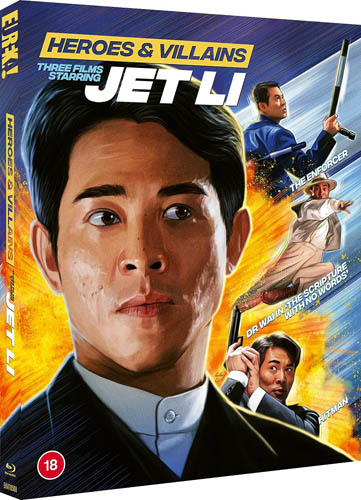
DISC ONE – THE ENFORCER [1995] – AKA KAP BA BA DIK SUNG, MY FATHR IS A HERO
RUNNING TIME: 104 mins
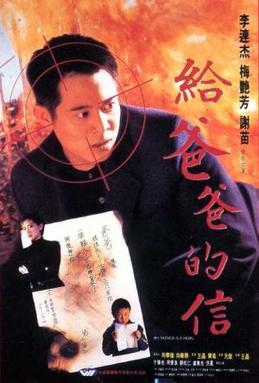
Chinese police officer Kung Wei is a loving husband to his ill wife and a loving father to his martial arts student Ku, but has to spend a lot of time away from his family because he works undercover, to the point of being arrested right in front of his family as part 9f a mission to infiltrate the gang of Po Kwong. He escapes prison with gang member Blackie but has to prove his loyalty by taking part in a robbery in Hong Kong which attracts the attention of Hong Kong detective Anne Fong. Wei takes her hostage before leaving her tied to a pole. Fong thinks there’s something suspicious about Wei and travels to Beijing where she discovers his true identity and meets with his family, who Wei finds increasingly hard to stay in touch with….
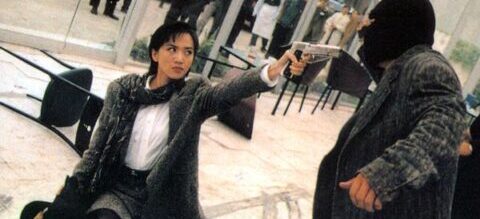
There’s a lengthy section nearly half way through The Enforcer where a character is dying and we spends ages on the situation, the emotion being ramped up to a degree which some may find saccharine. But then there’s also a shockingly vicious moment where a bad guy smashes a young kid’s face through a glass table – okay, we’ve all frequently seen such moments but there’s something different when it involves a child. Plus funny fight scenes of said kid beating the crap out of bad guys and leaping all over the place. Yes, welcome again to the kind of Hong Kong cinema which changes tone and even genre, though unusually intentional comedy is virtually absent here. The Enforcer, which seems to be better known as My Father Is A Hero, and which has nothing whatsoever to do with movies starring Humphrey Bogart and Clint Eastwood, most certainly delivers on the action front, and those who feel, like me, that wire-fu doesn’t really suit modern day-set stuff, will be pleased that it’s been reduced a fair bit. In fact some bits are almost out of classic Jackie Chan as Li ducks, dives, spins and leaps his way around some typical environments. But there’s also a hell of a lot of family melodrama, which may irritate some who are just here for the fights, but then some of Chan’s classics actually devote far more of their running time to comedy than action. I personally found this film to be one that works in several ways, and was genuinely involved with the emotional material rather than feeling that it dragged down the pace or wasn’t necessary. And how can you not like a film which offers the sight of a young boy battling alongside Anita Mui and then Li himself, perhaps peaking when Li swings him around on a rope as a weapon, and of course for real. There are several such moments of considerable cool in a film that offers a variety of memorable scenes of differing types despite its often absurd storyline.
The titles are intercut with shots from the back of a few boys practicing which cuts to a much wider shot of a great number of them performing moves at a wu shu competition in a stadium. Our hero is first seen on the phone, saying he’ll break someone’s legs, before seemingly buying some drugs. However, just as he presents the money, he turns on the three guys and fights them while some notes are still in his mouth, while intercut with his son Ku performing. Of course neither Ku nor Mrs Wei are that happy that dad isn’t there, but then they’re probably used to it. Wei races on a bicycle [with a bad guy in a huge bag on it] to the stadium, but has to fight more villains at the door. Ku’s smile as he sees his dad enter is heartwarming and the first of many moments where little Tse Mo as Ku will melt your heart no matter. The villains are still coming and Wei gets a little help from his boy. Next we see father, with his head submerged in water, holding son’s head also in water for a rather long time. No, he’s not being cruel [I suppose], he’s not just toughening him up but is setting up a plot device which will later on be employed to death. Wei and Ku have to attend a gathering where Ku will be getting a citizen’s award, but of course dad can’t make it because he’s also been pretending to be a gangster and doesn’t want to be near the police or on camera. Ku’s upset but Wei says that he’ll give up smoking and even buys him an expensive watch, though Ku doesn’t want to wear it because of its value. Wei seems to get well paid for his dangerous job which keeps him apart from his family for long periods and and even has him lying to them – and now being dramatically arrested in full view of them. However, it’s hard to sympathise with him when he knows his wife has bad asthma and still goes ahead.
Once in the police station Wei is briefed by his boss on what he he has to do before being taken to prison where he shares a cell with Blackie, though not for long as they make a successful run for it and climb despite the prison dogs who Wei kicks, punches and snaps to death in a fairly well edited and convincing example of its type. In a moving scene, Wei goes and tells his son that he’ll be away for a while and that he’ll now be the man of the house, but it’s Blackie who’s actually able to comfort him more. The two hook up with Po and his lot but have to commit a robbery which turns into absolute mayhem when rival gangsters turn up. A masked Wei has to act mean and even takes a hostage, but Inspector Fong gets him to take her instead. As more police turn up, Wei drives off with Fong in the car, then in a chase first saves her from falling then ties her up. However, things aren’t good at home. Mum is getting more and more ill and son is being mocked and beaten at school because of his father’s arrest, cue for a whole section of scenes which really go for the throat, from Ku reading a letter to his father which is actually blank, to Wei beating the crap out of someone when, in a roomful of hoods, his beeper goes off with some very sad news on it. The sappy music is repeated over and over again and maybe things go too far with a flashback montage, but here’s the thing; I don’t mind heavy sentiment if I do care. I know a lot of folks are resistant to it, especially it seems critics, but I reckon many viewers will be moved if they allow themselves to be. Anyway, both Ku and Fong head off in search of Wei, but of course you just know that this is soon going to put the both of them in extreme danger, while Wei still has to play gangster.
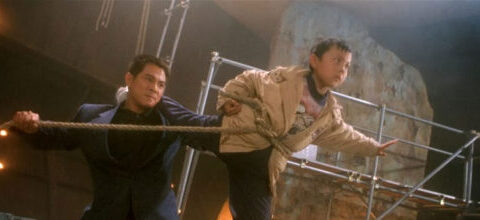
After the opening fight comes the attempted robbery which causes an extended shoot out in a glass paneled restaurant and other action outs, with an impressive car crash through the windows, Li sliding down the glass ceiling while shooting people, and Mui giving off a Michelle Yeoh-style vibe as the tough detective, though she only beats up one guy. It’s then a while before anything exciting happens, and even then it’s not from Li, it’s from Miao whose character eventually takes on his bullies. The choreography allows them to perform almost as if they were adults, and they seem to be doing most of it as well. Soon after this Miao and Mui join forces to fight off a group of thugs at a harbour. Mui was never a martial arts actress, but she does her very best here, pulling off some solid moves even though her occasional doubling isn’t very convincing. It’s a somewhat comical sequence, but one that will stick in the mind. Li, after much simmering where you really want him to kick off, finally lets lose with several fine sequences, beginning with a battle with Yu Rongguan in an atmospheric rainy street which somehow has them both soon hanging on to a moving truck, before some great tonfa-wielding against multiple opponents. Li actually looks in danger of losing when, after Rongguang for some reason has been disguises his kicks and punches by twirling his long flowing overcoat around them, he’s joined by skillful performers Collin Chou and Ken Lo, all three of them kicking at Li with great intensity while he struggles to keep up in what is one of Li’s most intense moments. With Ku coming to his father’s aid, the use of wirework is increased significantly so father fights more like son, but the action is all of pretty high quality.
The main villain Ko is one of the nastiest of the period. Early on he demands that his underlings think up a good plan. When Blackie suggests something that isn’t to his liking, he punches him in the stomach while the poor guy apologises for spraying him with blood, then kicks him off the side of a building. Rongguang is truly intimidating in the part, and we’re on tenterhooks as to what he’s going to do next. By comparison we have Blackie, played by the great car stuntman Blackie Ko who always exudes a likeable screen presence, and is great here as the stereotypical crook with a heart of a gold. His relationship with Po is in some ways the nicest in the film, partly because it adds just a bit of humour, and partly because Blackie is able to get Po to relate to him in a way that his dad struggles to do. As for Li’s character, who’s introduced with a very un-Li cigarette in his mouth, were we intended to like him as little as we do? He tries to do his best to keep in touch with his son but makes some really bad choices, and in the film’s most intense scene, we desperately want him to try to stop something that’s going on right in front of him. Li does very well in this scene, and he and Maio certainly share the necessary father / son chemistry, the two not long having also appeared together in The New Chamber Of Shaolin. He and Mui share it too, especially in one of those half-jokey fight scenes which can be seen as a sort of foreplay, though the romantic element, which also involves Wong being involved with her boss, is generally very downplayed. Wong is also rather dislikeable at times, especially when she tells Wei’s wife that he was involved in selling pornography! Surely she could have told the poor sick woman something else.
Director Corey Yuen and cinematographer Tony Lau Mo sometimes give us some odd angles during the action and a few notable single shots, like a weird one of two men silhouetted against a white wall while some incredibly obvious product placement is in the foreground. The first fight between Li and Ronggruang looks stunning, with great stylish rain shooting, though nothing else in the film resembles it. It’s absolutely insane how much bad stuff happens to Ku and yet we’re asked to believe that he’ll be okay, and let’s not get into certain daft elements of the plot, such as the ridiculously easy way Fong finds out the truth about Wei. And what kind of doctor can’t tell that a person isn’t dead but just holding their breath? Nonetheless, The Enforcer is a rewardingly intense experience if you willing to go with it.
Rating: 









SPECIAL FEATURES
1080p presentation of the fully uncut Hong Kong theatrical cut from a new 4K restoration
The usual excellent restoration, well up to standard. No need for me to go into detail.
Original Cantonese mono audio
“Classic” English dubbed audio
Newly translated subtitles
Brand new audio commentary by Mike Leeder & Arne Venema
The hell for leather nature of Hong Kong moviemaking can almost be summed up by Leeder’s great stor about Blackie Ko beating up a director causing film production to be halted for a year, while Leeder also describes being quickly taken down by Li before shooting started for a scene in Fearless, and Hong Kong cinema’s habit of renaming movies to make them seem like sequels to more successful outings. Meanwhile Venema describes an epic real-life gun battle which has similarities to the one in this film, explains that an odd few lines in the film are actually a joke playing on the Cantonese slang word for pornography, and says that he’s not allowed to have beach barbecues because natural disasters keep happening at the same time, a good example of how superstition in Hong Kong is still rife. And an assortment of other, only vaguely related facts are heard, such as Leeder saying that houses in Hong Kong often being colder than it is outside, and when Leeder and Venema first started training in martial arts, all coming together in a track which is a great listen from beginning to end.
“Crowd Pleaser” 2009 interview with producer Wong Jing [18 mins]
From the North American Dragon’s Dynasty release come these three interviews. Here, Jing begins by describing Li as a quiet, shy man unless he’s around girls where he talks a lot and tells stories, before going on to say that this film wasn’t originally intended to be much of a martial arts movie and to star Li, and that the shop in the film was built then destroyed on the site where producer Jimmy Herne’s house was then built.
“Like Father, Like Son” 2009 interview with actor Tse Miu (16 mins]
Miu, who doesn’t look much older than he did in 1992, says that he was originally cast as a rich young master’s kid but Jing said that he didn’t act like one, which reveals that the script must have been changed a hell of a lot. He also says that he still keeps gifts that Mui, who was very kind to him and even got him inro the right state for his crying scene, and tells a lot of his very interesting experiences on set, such as struggling to breath underwater in-between bursts from an oxygen tank; he couldn’t do it and when he asked the action director to do it even he struggled so the idea was scrapped.
“Born To Be Bad” 2009 interview with actor Ken Lo [20 mins]
Jackie Chan’s bodyguard for ages, who likes to call people Brother and Sister discusses having most of his part cut out of The Enforcer [though you can’t really tell], and says how TV is so tame; people on a set couldn’t believe that, instead of having a tree already cut, he could kick it down himself. Most interesting are his descriptions of the absolutely boiling Golden Harvest set and offices; his recalling of imagining that Bruce Lee’s spirit was around charmingly finishes off this particularly good interview
Deleted Scene from the Taiwanese Version [1 min]
With burned in subtitles which will recall for many the video [legit and not so legit] days, this scene has Po Kwang and one of his thugs wonder if Wei could be an undercover cop. It occurs before the scene where Little Ku appears on the news. It’s pretty good and I feel that it should have been left in.
Hong Kong Theatrical Trailer [1 min]
DISC 2 – DR WAI IN THE SCRIPTURE WITH NO WORDS [1996] AKA MO HIM WONG
RUNNING TIME: 90 mins
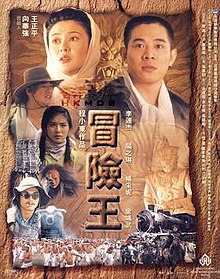
Chow si-kit is a writer of serial adventures for a newspaper. However, he’s heading for a divorce and this gives him writer’s block after 93 of the 100 stories he was contracted to write, but he’s temporarily able to escape from reality by imagining himself as the hero in his stories, the King of Adventurers in 1930s China, with his wife, Monica, being the villain. Even some colleagues get their roles in his imaginary world, two of whom try to come with ideas as to finishing the last seven stories which sends our hero and helper undercover to a ball at the Japanese embassy in Shanghai to snatch a letter that will lead him to a mysterious box and scripture….
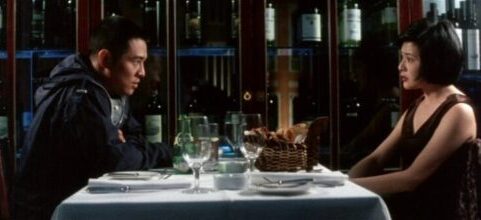
A great many of Hong Kong films exist in more than one version. For some reason the likes of Taiwan and Singapore would often end up with longer edits of films which were then cut down for their domestic releases, while censorship in some other regions sometimes meant that scenes or shots had to be cut and even endings changed. Unsurprisingly, many films were also altered for release in non-Asian territories; distributors being of the opinion that re-tailoring for the international market had to be carried out. Material that [supposedly] slowed down the pacing or would be lost on most western viewers would go, which is understandable, but, quite bafflingly, action would sometimes be removed too. However, was there ever such an extreme difference between the local and the international releases of a Hong Kong film as in the case of this one? Though told by a father to a son, Dr Wai In The Scripture With No Words is one of many Hong Kong movies clearly inspired by the Indiana Jones franchise in its International version, with Jet Li rummaging in tombs and battling Japanese while searching for a mysterious artifact. However, its Hong Kong version is about a writer who retreats into the fantasy world he’s created as a way of dealing with the failure of his marriage. There’s still much adventuring, but takes a meta-fictional approach. In actual fact a fire burnt down much of the set and a lot of the film, causing much rejigging of the screenplay, modern sequences being much cheaper and quicker to shoot. I reckon that the Hong Kong edit would have got the film a bit more international attention. It’s a more interesting experience even though one feels that it doesn’t entirely succeed in what it sets out to do.
The main part of this review will focus on the Hong Kong edit, though both versions begin, as they should, with an adventure, and set, of course, in the 1930s. “My nickname is the Adventure King, I am a novel writer and adventurer, during our latest expedition my student and I got lost” narrates Si-kit, as we see two men struggling along a mountain. After “Walking for three days and three nights” they stumble upon a huge pit where loads of slaves are pulling along a huge metal ox, the first indicator of the high budget this production was given. Inside the ox is a mad professor who randomly pulls a lever and causes the bull to breath fire, after which it breaks free and runs amuck. Cut to a man waking up; it was all in his head! Si-kit is struggling bigtime, being behind schedule, having writer’s block and with a wife who wants to divorce him. His boss sleazily flirts with her over the phone right in front of him and he’s told of an older colleague who’s had virtually a lifetime of trouble and misery caused by women. At a meeting with her in a restaurant, he stands up to her and refuses to divorce her, while she says that she wants to separate from him. With her is a smarmy lawyer who she might just be seeing, while watching them are Yan-yan and Chan, two co-workers who have their own romantic complications going on. Si-Kit goes and gets wrecked on vodka, and we go back in the Adventure King’s adventures. Despite being supposedly exhausted from those three days and nights of walking, he’s quickly able to stop the rampage by tying the ox to a hill. This little episode is a bit odd and all the better for it, but it’s soon on to the main thing as he’s ordered to find this scripture which can tell the past, present and the future. It’s in a box which has killed or burned the faces of people who tried to open it; the Japanese stole it from Tibet and a letter which has the location written on it is now in the Japanese embassy.
Yes, it’s a little flimsy, but then again the adventure plot isn’t what’s at the centre of the tale in this version so it shouldn’t matter really. Now we get yet another scene of Li in drag. The Adventure King and his companion have to get into this swish do and find and take this letter, which is where it starts to get quite unusual for what is essentially a mainstream Hong Kong action movie. Back in the real world, Yan-yan, thinking that Si-kit and Monica should get back together, decides to make her contribution to the story series and says that she will introduce a female character whom the Adventure King will fall for. He bumps into Japanese lady Kamiko, replete with this exchange; “it’s a hobby, sometimes I’m a man, sometimes I’m a woman”, “I’m a man, I can see that you’re a very attractive woman”, “I prefer you as a woman“. “Oh how modern” some might say, but this kind of thing is not uncommon in Hong Kong cinema. Li’s first fight then finally takes place, after which Kamiko is left with a letter saying “Miss Kammy remember my name, the rest of your life will be linked with mine”. Such lovely old school swashbuckling-style stuff! However, Si-Kit doesn’t like the direction that the story is now going in, he hates his wife, so he changes Kamiko into a “merciless evil bitch” who “uses men for medical experiments”. This new incarnation of her is first seen dispatching a load of men with her whip, then insisting that a man she’s already tortured and even slept with be tortured again. Subtle! But will this version of Monica stay this way? Surely we want this couple to sort out their problems don’t we?
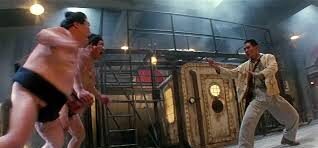
We probably have a good idea of how things will turn out, though matters stumble somewhat in the last section, as if screenwriters Lam Wai-lun and Sandy Shaw Lai-kin struggled to find decent ways of concluding things even though they basically knew what they’d decided upon in germs of the plot. And how on earth did Si-kit do one particular thing [offscreen] without burning himself? Presumably the scene was unfinished and may have been originally intended to give us an explanation. Li, who also gets to ride a horse several times, does a reasonable amount of fighting, though he’s in full wire-fu mode, where the touch of Ching Siu-tung can be seen with undercranking, slow motion and odd angles. About twenty minutes in he fights a bunch of Japanese, the most skilled of them twice. This is one of those scenes where Li barely seems to sweat a muscle as he neatly bests his opponent, with the aid of a very special pen [of which he later reveals has loads of them in his jacket] which is certainly mightier than the sword. Not long after, Charlie Yeung as Yan-yan holds off a few guys until Billy Chow’s Chan and eventually the man himself come along to help. Li goes on to battle a hook chain-wielding Collin Chou in a warehouse; after this ? Chou’s character becomes a sort of demon whom Li has to fight twice, once on a plane on a scene which is really thrown away, but sadly he’s not intimidating; it seems like the filmmakers realised this because, despite engaging in a flaming sword battle with Li, he’s in a “he’s behind you” – or rather “he’s beside you” gag. Li also has to battle ninjas and sumo wrestlers in two very cool if totally gratuitous sequences.
Unfortunately, the fight we really want to see – Li vs the whip-wielding supervillain Rosamund Kwan – doesn’t take place. after all, she’s introduced so dramatically and is then seen slicing some people on a train station on her way to assassinate some leader. Of course Kwan wasn’t really a fighter, but that never stopped a lot of fight scenes being staged. The fact that Kamiko represents Monica was probably why we didn’t see this, but then again it could also have fit into the situation. And I can’t help but admit that the most exciting scene for me was a spectacular set piece of a train crashing through a town. It’s truly impressive in terms of model work, filming and dramatic effect, only slightly marred by a few silly shots of people being pulled on wires. Even if you don’t include a goofy rat scene which may or may not have been intended to be quite as ridiculous as it is, this has much more humour than The Enforcer though, despite Li usually being good with comedy even if he never got into Jackie Chan-style clowning, it’s not great. It can basically be summed up by a character wearing a basket on his head. You’ll probably smile but not laugh. Some viewers today will not smile at a scene where a crowd of people egg Si-kit on to hitting his wife, while a section about a newspaper office is very rushed and a bit confusing, and Li may look cool in his white outfit but barely has a character to play in the fantasy segments. Are the psychological and meta aspects fully taken advantage of? Well the film never attempts to be too deep, but scenes where, for example, a row between our husband and wife spills over into the fantasy world are quite audacious. Meanwhile the parallel romance involving Chan and Yan-yan is rather sweet and a nice counterpoint to the main plot. It’s hardly complicated; they like each other but she’s willing to make him jealous to admit his feelings. The playing of Charlie Yeung and Takeshi Kaneshiro is perfectly pitched.
Dr Wai In The Scripture With No Words is probably more coherent than it should be, but, my tastes being what they are, I could have actually done with the weird elements being enhanced and more explored. Coherence is overrated! Nonetheless there’s a lot to enjoy even if it doesn’t really satisfy to any great degree.
Rating: 









SPECIAL FEATURES
1080p presentation of the original Hong Kong theatrical cut from a new 2K restoration
This looks only slightly less impressive than The Enforcer. The original elements probably weren’t in quite as good a condition, but clarity, depth and colour are still highly impressive.
Original Cantonese audio available in; DTS-HD MA 5.1, stereo and original mono presentations
“Classic” English dubbed audio
Original Alternate “International version” presentation [English and Mandarin audio options]
I had seen this version before because I used to own both edits on video, and just as before I found it inferior to the other version, though, again as before, i did wish that some bits exclusive to it were in the Hong Kong version, notably a lot of Rosamund Kwan [perhaps it’s best that Leeder, who adores Kwan, and Venema didn’t do the commentary on this one!]. One wonders why they left out so much stuff for the Hong Kong version. I reckon that one could put together a quite satisfactory version which incorporates all footage. For a while this edit proceeds just like the other one despite Si-kit’s son’s narration which is rather annoying in places, but more and more added stuff comes, mostly additions to the Si-Kit / Kamiko relationship, while scenes are shifted around or altered, such as wounding from Si-kit’s special umbrella replacing that letter. There’s also a goof at the conclusion of a fight in this version, where Si-kit gives a villain some money which made sense in the Hong Kong version but which doesn’t here and should have been cut out. See if you can spot it. The altered conclusion is both sadder and weirder. Due to the original elements being lost, the exclusive footage is only in SD, though it’s not that distracting.
Newly translated subtitles
Brand new audio commentary by Asian film expert Frank Djeng [International version]
Djeng goes solo, which of course means that there will be just as much to take in as there would be with him and another person. Usually this means going at a very fast speed through his track, though he’s not much that way here. He begins by saying that he prefers the International cut because it flows more smoothly and has so much extra footage in the “past” sequences, though like me isn’t too fond of the humour in either version. We learn some interesting stuff, such as the fact that Mandarin tracks of Hong Kong films were dubbed by Taiwanese Mandarin-speakers [the two versions being rather different] simply because Taiwanese would not like films in Chinese, that Li’s wife was jealous of his scenes with Kwan and left their house until he apologised, and that the Dr Wai character is from a series of books though the film only used the character and nothing more. In pointing out minute differences, Djeng is puzzled about lots of tiny cuts to scenes in the Hong Kong version which I didn’t notice; I feel the same way.
The Smart and The Brave – archival Jet Li featurette [7 mins]
Unfortunately the burned in subtitles are mostly below the frame in this brief showcase for Li’s skill, the highlight being him fighting a Japanese guy in a lovely Shaw Brothers-style set.
Original Hong Kong trailer
DISC 3 – HITMAN [1998] AKA SAT SAU JI WONG, CONTRACT KILLER
RUNNING TIME: 98 mins
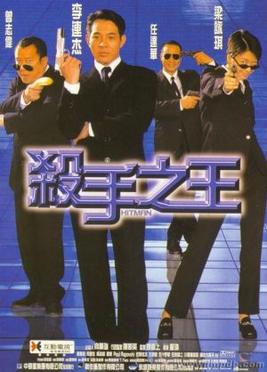
In Hong Kong, hitman the “King of Killers” murders ex-yakuza crime boss Tsukamoto. Because Tsukamoto had established a revenge fund in case of an assassination, a US $100 million bounty is placed upon the King. The deceased’s power hungry grandson, Eiji, becomes the new head of the Tsukamoto family and one of the bounty hunters, as do ex-soldier Fu and Lo, a seedy small-time criminal who hires Fu as his muscle. However, Fu isn’t the killing type and doesn’t pull off his first hit, instead saving the man’s child when other bounty hunters arrive on the scenehis first victim. Then the initial suspect of Tsukamoto’s murder turns out to be somebody he knows….
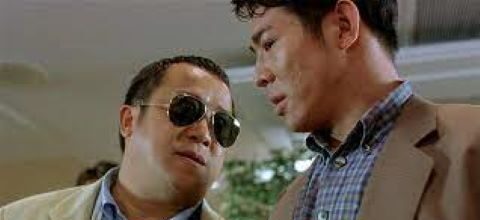
Hitman is easily the weakest of the three films that comprise this set. That’s not so say that it’s bad; the fairly lighthearted though of course still bloody assassin thriller has some good action, a decent plot even though the I guessed the identity of the King of Killers really early on as soon as a certain character showed up, and a few comic scenes which may not be particularly funny but are somewhat memorable nonetheless. There’s the bit where Fu is preparing an omelette. He eats it in the room next to his Indian neighbor. Fu offers him something, and the Indian kindly gives a thumbs up. Then he offers his plate to Fu, who, to the Indian’s confused look, immediately takes the whole piece, bites into it extensively, and also gives a satisfied thumbs up. Weird but it sticks in the mind, as does the scene soon after where the hitmen are casually discussing the best ways to shoot people and what their plans for the future are. And what about the Japanese villain near the start? What better way to let us know he’s not a nice guy whatsoever then to have him watch real footage of Japanese World War 2 atrocities and say “Chinese women are better sex mates…..have moral integrity….when I rape them and they scream in pain, they really turn me on”? The piece gives us a rather interesting person for Li to play; a would-be hit man who’s just doesn’t have the killer instinct, though Li doesn’t seem too interested and the screenplay by Chan Hing-kai, Vincent Kok and Cheng Kam-fu doesn’t do enough with the character. As for the fights, they’re not particularly plentiful and the first three brawls are almost over before they’ve even started, but, even more than The Enforcer, the filmmakers and Li really do find a way to make Li’s style seem more appropriate for a modern setting.
A Star Wars-style scroll tells us that “Recently a strange killer has appeared. He doesn’t ask for payment. All his eliminated targets were elites who deserved t0 die. Rumour has it that he calls himself Blazing Angel. But in the world of professional killers, he is known as the King of Killers”. Of course we begin proper with a typical hit by said super hitman, introduced nicely with a woman dancing in room to music and World War 2 footage on TV, before the camera pans to the right and then up to reveal a hooker and a much older man. All things seem to be in order in the security office but then the lights go off, a gas cannister is thrown in, and a protective suited person shoots and strangles his way up to the top floor when the afore-mentioned villain’s office is. Said villain, yakuza crime boss Tsukamoto, tells the intruder that he’s established a fund to avenge his death, now worth US $100 million, before shooting him twice. Now we get a nice little moment that tells us something about Li’s character, where, in a shop, an item has been wrongly priced, it should have been cheaper. There’s a queue at the till so the cashier won’t give him a refund and he doesn’t want to exchange it for something else. It ends strangely with a coin rolling down the street in closeup to end up n the hands of a beggar, but it would have been nice to see a few more scenes like this about Fu, especially considering that two or three other ones that are actually in the film are hardly necessary. Anyway, Fu’s boss sends out all the other hitmen after this bounty, whom he tells off because he’s not exactly right for this particular job. “I sent you to collect money and you ended up cleaning drainpipes”, ” I sent you to kill a man, instead you lent him your knife to cut his watermelon“.
Meanwhile things are hotting up in the Japanese camp, with Eiji demonstrating not so much his determination to find his father’s killer nor his power but his nuttiness and a seeming lack of respect for family and the dead by grabbing dad’s ashes and eating them. Fu attempts to enter the building where Tsukamoto’s lawyers are discussing the terms of the revenge fund, but is rebuffed by the security. When he defends himself, his martial arts skills attract the attention of Lo, who’s also seeking the bounty on the King of Killers but is hardly a killer despite always getting himself into trouble and agrees to hire Fu as his muscle. They are warned not to pursue the case further by Inspector Chan, a member of the Hong Kong Security Bureau. To test Fu’s abilities, Lo takes on a small contract to kill a local gang member, while also outfitting Fu and allowing him to live in his home. Fu soon meets Kiki, Lo’s daughter, who is a successful attorney and ashamed of her father’s sleazy activities, and they become friends. The hit is to be at a fairground where Lo wins a doll for a child; said kid turns out to be the son of his target, and Lo certainly doesn’t want to murder someone in front of their kid, so he finds himself engaging in a gun battle with some other assasims. Martin, the head lawyer in charge of Tsukamoto’s revenge fund, makes the discovery that prior to his death, the crime lord was forced to swallow old Chinese wartime promissory notes. He sells this information to the bounty hunters, and as Eiji is willing to pay the highest amount, he’s the first to learn the serial codes on the notes. Fu and Lo follow Eiji to a small apartment complex, where they learn that the suspect is an old man named Uncle Leung, an acquaintance of Lo’s that he’d previously been searching for. Leung then dies from different means and guess who’s blamed for it?
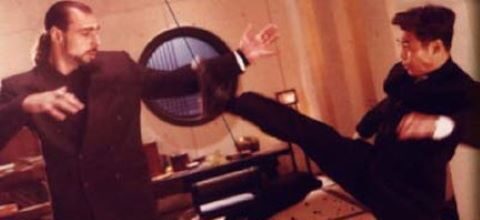
The fairground shootout, while not that long, is blisteringly staged; the moment when Fu suddenly sees some other assassins nearby is rather frightening, especially as we know that Hong Kong filmmakers are far more happy to kill or brutalise young children onscreen than American ones. Fights are tantalisingly tiny until Li faces off against Paul Maclovsky for the first time, the latter aided by lights on his feet and his hands which he’s able to shine in Li’s face. Not long after that Fu, not aided much by Lo, has to fight off multiple Yakuza hitmen and another Caucasian, a grenade wielding assassin disguised as a priest, leading to some cool stuff in a lift with Li fighting, falling down a lift shaft and an out of control lift. As with some of the afore-mentioned material, it could do with a bit longer even if what we see is pretty good anyway, and there does seem to be an attempt to keep the action fairly realistic. Could the film have done with more? Considering that the drama really isn’t that great despite its considerable potential, I’d say yes, even if the final act does certainly deliver, beginning with some seriously cool gunplay. Then Li has a rematch with Maclovskly while Simon Yam’s Inspector Chan face off against a sword-wielding Keiji Sato and Eric Tsang’s Lo has a Japanese lady to deal with; obviously Lam wasn’t a martial artist so realistically Li’s character has to intervene, but Tsang was one in some respects. His fight makes great use of a belt and broken glass on the floor; it’s interesting that, out of all the violence in the film, we probably feel glass on feet and a bottom most painfully.
The screenwriters are perhaps a little bit too in love with Leon [though admittedly it’s an easy film to love], with several jokes deliberately referencing Luc Besson’s film [and one of them also referencing A Better Tomorrow], not to mention a hugely similar opening scene. The director is Stephen Tung, a guy who’s still best known, no doubt to his considerable annoyance, as the boy who’s told at the start of Enter The Dragon by Bruce Lee, “Don’t think, feel! It is like a finger pointing away to the moon. Don’t concentrate on the finger or you will miss all that heavenly glory”. He struggles with tone but does just about maintain a solid pace on a film on which could possibly have really slowed down in other hands. Sadly Li just seems bored, and he and Tsang lack the chemistry to really make the relationship between their two characters work. Tsang can be a bit of an annoying presence onscreen, and his character here comes off as really obnoxious for quite some time, even if Li has a scene where Fu lets us know that he knows he’s being used. Nonetheless the scenes with Tsang and Gigi Leung as Kiki, Lo’s daughter, do have a degree of poignancy about them. “I hope that one day you’ll be lecturing me” she says to her deadbeat father. However, even though it pleasingly reminded me of some bits in the later Unleashed aka Danny The Dog which is hands down my favourite Li film [yes I know what an eccentric opinion that is], did we need that lengthy sequence of Fu and Koki out at the ice skating rink, with Koko teaching Fu skating, especially as, typically for a Li film, there’s no actual romance.
Hitman doesn’t really get to a higher level. There’s nothing outstanding to see here, but enough of interest and quality nonetheless to make viewing it a worthwhile experience.
Rating: 









SPECIAL FEATURES
1080p presentation of the original Hong Kong theatrical cut from a new HD restoration of the original film elements
Considering this is just from a normal HD scan, it looks darn good. The colour balance is striking and the blacks deep. The occasional very soft shot is probably due to the original presentation.
1080p presentation of the US “Contract Killer” release version
I did skim through this version. Much of the humour seems to be missing, and they’ve added a hip hop soundtrack which is intrusive in some places. However can see why these changes were made, and it’s nice that Eureka were able to include it.
Original Cantonese mono audio
“Classic” English dubbed audio
Newly translated subtitles
Brand new audio commentary by Mike Leeder & Arne Venema
I believe that these two are on a role right now, their tracks are just incredible. And let’s be honest: Hitman isn’t a film about which a huge amount can probably be said, even though it’s still solid fare. So the fact that Leeder and Venema spend much of the time totally ignoring what’s on screen can’t really be seen as a flaw. We still learn that Li, upon being asked how he would kill Maclovsky in real life if the occasion demanded it, showed everyone very quickly to see how he’d do it, And we’re interested to hear things that, for example, Leeder encountered the very same beggar in Hong Kong and Singapore, and a very forceful beggar at that, while the duo also talk about the differences between Hong Kong and western fortune cookies, to a guy sleeping standing up on the set of Fearless, to Leeder being scared to get a tattoo on his bum.
Archival interview with Jet Li [10 mins]
You jus know that this is a Hong Kong Legends interview when we have slightly odd dance music busying away in the background. Li says how how movies were much better than demonstration tours in terms of bringing wu shu to people, names his two favourite movies from the ones he’s made, and describe bis two very different personalities, one of which is like Wong Fei-Hung and one of which is like Fong Sai Yuk.
Archival interview with Simon Yam [7 mins]
Also from Hong Kong Legends just like the interview below, this oddly intercuts two Yam interviews, one from the set on a film and a later one in a cinema. Lam tells of how action is international cinema, how he’d actually prefer to make love stories which, unlike action films, aren’t filmed on extremely hot sets where you can’t sleep, and that he loves Mickey Rourke.
Archival interview with Keiji Sato [13 mins]
Sato says how an ancestor of his was a great swordsman, how he loves Li as a teenager, and that Wei was happy to get the set for the Japanese changed after he told them what was wrong with it.
Opening night footage [11 mins]
The film’s stars are seen entering the cinema, being photographed, and chatting to the press.
Trailers
SPECIAL FEATURES
Limited Edition O Card slipcase featuring new artwork by Sam Gilbey [2000 copies]
All three films presented in 1080p HD from new restorations across three Blu-ray discs
Limited edition collectors booklet featuring new essays by Simon Abrams and David Desser [2000 copies]
Despite its rather odd title [Li doesn’t play any villains] and seemingly random selection of films [“The Enforcer” clearly being the standout], this set should keep most Hong Kong movie fans happy, what with the usual excellent commentaries to enjoy. Recommended!


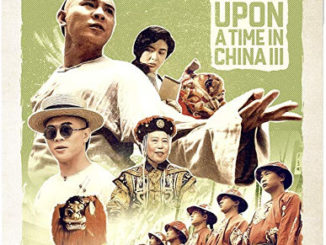
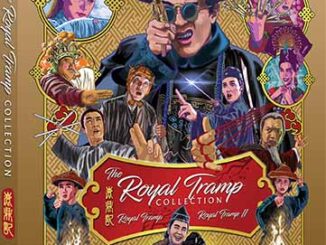
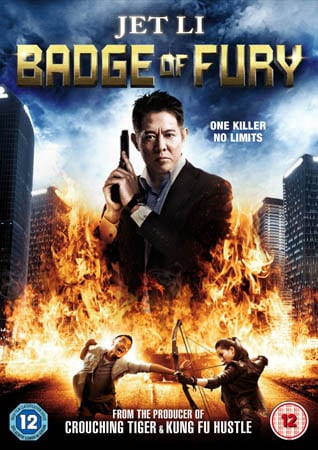
Be the first to comment